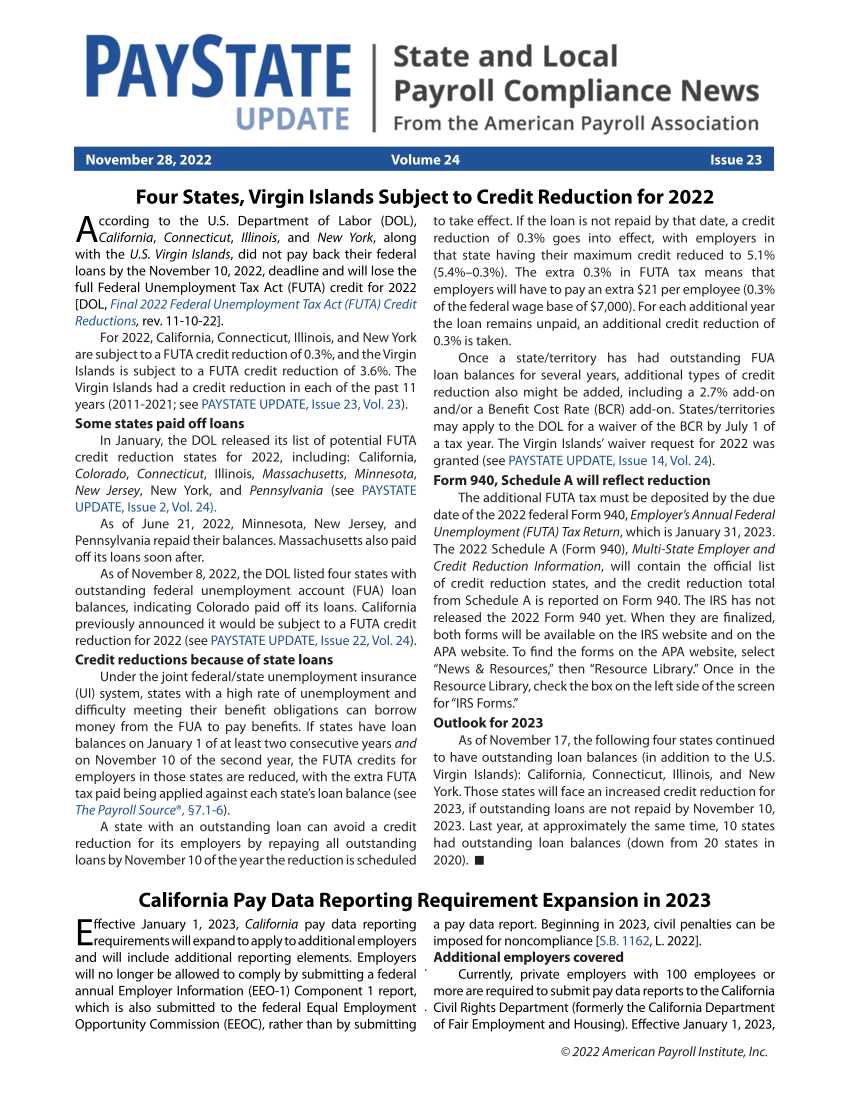© 2022 American Payroll Institute, Inc. Four States, Virgin Islands Subject to Credit Reduction for 2022 According to the U.S. Department of Labor (DOL), California, Connecticut, Illinois, and New York, along with the U.S. Virgin Islands, did not pay back their federal loans by the November 10, 2022, deadline and will lose the full Federal Unemployment Tax Act (FUTA) credit for 2022 [DOL, Final 2022 Federal Unemployment Tax Act (FUTA) Credit Reductions, rev. 11-10-22]. For 2022, California, Connecticut, Illinois, and New York are subject to a FUTA credit reduction of 0.3%, and the Virgin Islands is subject to a FUTA credit reduction of 3.6%. The Virgin Islands had a credit reduction in each of the past 11 years (2011-2021 see PAYSTATE UPDATE, Issue 23, Vol. 23). Some states paid off loans In January, the DOL released its list of potential FUTA credit reduction states for 2022, including: California, Colorado, Connecticut, Illinois, Massachusetts, Minnesota, New Jersey, New York, and Pennsylvania (see PAYSTATE UPDATE, Issue 2, Vol. 24). As of June 21, 2022, Minnesota, New Jersey, and Pennsylvania repaid their balances. Massachusetts also paid off its loans soon after. As of November 8, 2022, the DOL listed four states with outstanding federal unemployment account (FUA) loan balances, indicating Colorado paid off its loans. California previously announced it would be subject to a FUTA credit reduction for 2022 (see PAYSTATE UPDATE, Issue 22, Vol. 24). Credit reductions because of state loans Under the joint federal/state unemployment insurance (UI) system, states with a high rate of unemployment and difficulty meeting their benefit obligations can borrow money from the FUA to pay benefits. If states have loan balances on January 1 of at least two consecutive years and on November 10 of the second year, the FUTA credits for employers in those states are reduced, with the extra FUTA tax paid being applied against each state’s loan balance (see The Payroll Source®, §7.1-6). A state with an outstanding loan can avoid a credit reduction for its employers by repaying all outstanding loans by November 10 of the year the reduction is scheduled to take effect. If the loan is not repaid by that date, a credit reduction of 0.3% goes into effect, with employers in that state having their maximum credit reduced to 5.1% (5.4%–0.3%). The extra 0.3% in FUTA tax means that employers will have to pay an extra $21 per employee (0.3% of the federal wage base of $7,000). For each additional year the loan remains unpaid, an additional credit reduction of 0.3% is taken. Once a state/territory has had outstanding FUA loan balances for several years, additional types of credit reduction also might be added, including a 2.7% add-on and/or a Benefit Cost Rate (BCR) add-on. States/territories may apply to the DOL for a waiver of the BCR by July 1 of a tax year. The Virgin Islands’ waiver request for 2022 was granted (see PAYSTATE UPDATE, Issue 14, Vol. 24). Form 940, Schedule A will reflect reduction The additional FUTA tax must be deposited by the due date of the 2022 federal Form 940, Employer’s Annual Federal Unemployment (FUTA) Tax Return, which is January 31, 2023. The 2022 Schedule A (Form 940), Multi-State Employer and Credit Reduction Information, will contain the official list of credit reduction states, and the credit reduction total from Schedule A is reported on Form 940. The IRS has not released the 2022 Form 940 yet. When they are finalized, both forms will be available on the IRS website and on the APA website. To find the forms on the APA website, select “News & Resources,” then “Resource Library.” Once in the Resource Library, check the box on the left side of the screen for “IRS Forms.” Outlook for 2023 As of November 17, the following four states continued to have outstanding loan balances (in addition to the U.S. Virgin Islands): California, Connecticut, Illinois, and New York. Those states will face an increased credit reduction for 2023, if outstanding loans are not repaid by November 10, 2023. Last year, at approximately the same time, 10 states had outstanding loan balances (down from 20 states in 2020). California Pay Data Reporting Requirement Expansion in 2023 Effective January 1, 2023, California pay data reporting requirements will expand to apply to additional employers and will include additional reporting elements. Employers will no longer be allowed to comply by submitting a federal annual Employer Information (EEO-1) Component 1 report, which is also submitted to the federal Equal Employment Opportunity Commission (EEOC), rather than by submitting a pay data report. Beginning in 2023, civil penalties can be imposed for noncompliance [S.B. 1162, L. 2022]. Additional employers covered Currently, private employers with 100 employees or more are required to submit pay data reports to the California Civil Rights Department (formerly the California Department of Fair Employment and Housing). Effective January 1, 2023, November 28, 2022 Volume 24 Issue 23
Printed for: PayrollOrg Bookshelf © 2024 American Payroll Institute, Inc. All Rights reserved. From: PayrollOrg Digital Publications (bookshelf.payroll.org)






